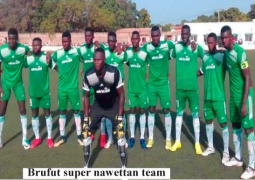
The forum recommended to national bureaux of member countries of the Brown Card Scheme to do their best to put in place this fund.
“One of the key outcomes of this meeting is the agreement to establish a revolving fund. That is a matter that has been agreed on.The process will be implemented in due course. Immediately after this meeting the national bureaux will make an effort to start to establish the fund with the support of their member companies,” Henry Jawo, executive secretary of the Insurance Association of The Gambia (IAG), said in an interview with journalists on Friday.
Slow payment of claims among insurance companies in West Africa has been the bane of the industry, especially in its Brown Card Scheme designed to insure or cover drivers and their vehicles, particularly commercial drivers, in the sub-region.
Mr Jawo said: “The claims settlement is slow because of the fact that the [Ecowas Brown Card] protocol requires the national bureaux to have the resources to be able to settle claims directly.
“But the national bureaux don’t have that; they have to wait for the insurance companies to settle before they [the bureaux] can settle, which is the main cause of the delay, and that is what council wants to get rid of by asking national bureaux to have this claims settlement fund.
“Once we have that in place, then this slow payment of claims will be a thing of the past. And I think it is achievable and we will work towards that in the near future.”
The Ecowas Brown Card is an international insurance certificate issued to motorists when they travel from their country of residence to another country within Ecowas.
It gives an extension of cover for third party liability only, according to Mr Jawo.
He says: “If your vehicle is involved in an accident in a foreign country and you cause damage to people’s property or people are injured or die as a result of the accident, the national bureau in that country handles the accident and the two bureaux, from the host country and the country visited, together prepare a documentation for the claim.
“The bureau of the host country settles the claim on behalf of the member insurance company. So when the process is completed the document is sent to the member insurance company that issued the original cover and that insurance company pays the amount of liability that is given to the victim.”
Mr Jawo touched further on the scheme. “The Brown Card Scheme is to protect victims of accident in a foreign country within Ecowas.It is just like you have so many different cards: in Europe you have the Green Card, in Central Africa you have the Pink Card.”
In his advice to drivers, Mr Jawo said the scheme had been established to protect them and they should, therefore, make maximum use of it.
“They must make sure that when they travel they have Brown Card cover because they can leave their host country to travel to another country within Ecowas,” he says. “If they have cover, it is for their own protection and for their won good; otherwise if they have accident and they don’t have Brown Card cover, nobody pays for that liability; he will be his own insurer and very few people may be able to pay for some of the damages that are caused in these accidents.
“My advice to them is for them to embrace the Brown Card because it is for their own protection and for the protection of their property.”
Subscribing to Mr Jawo’s advice to motorists, Adamou Bio, secretary general of the Council of Bureaux of Ecowas Brown Card Insurance Scheme, said drivers would have to embrace the Brown Card, because if they travel outside their countries without it and happen to involve in an accident, they may be prosecuted in addition to taking responsibility for the damage caused and its liability.
Read Other Articles In Article (Archive)



